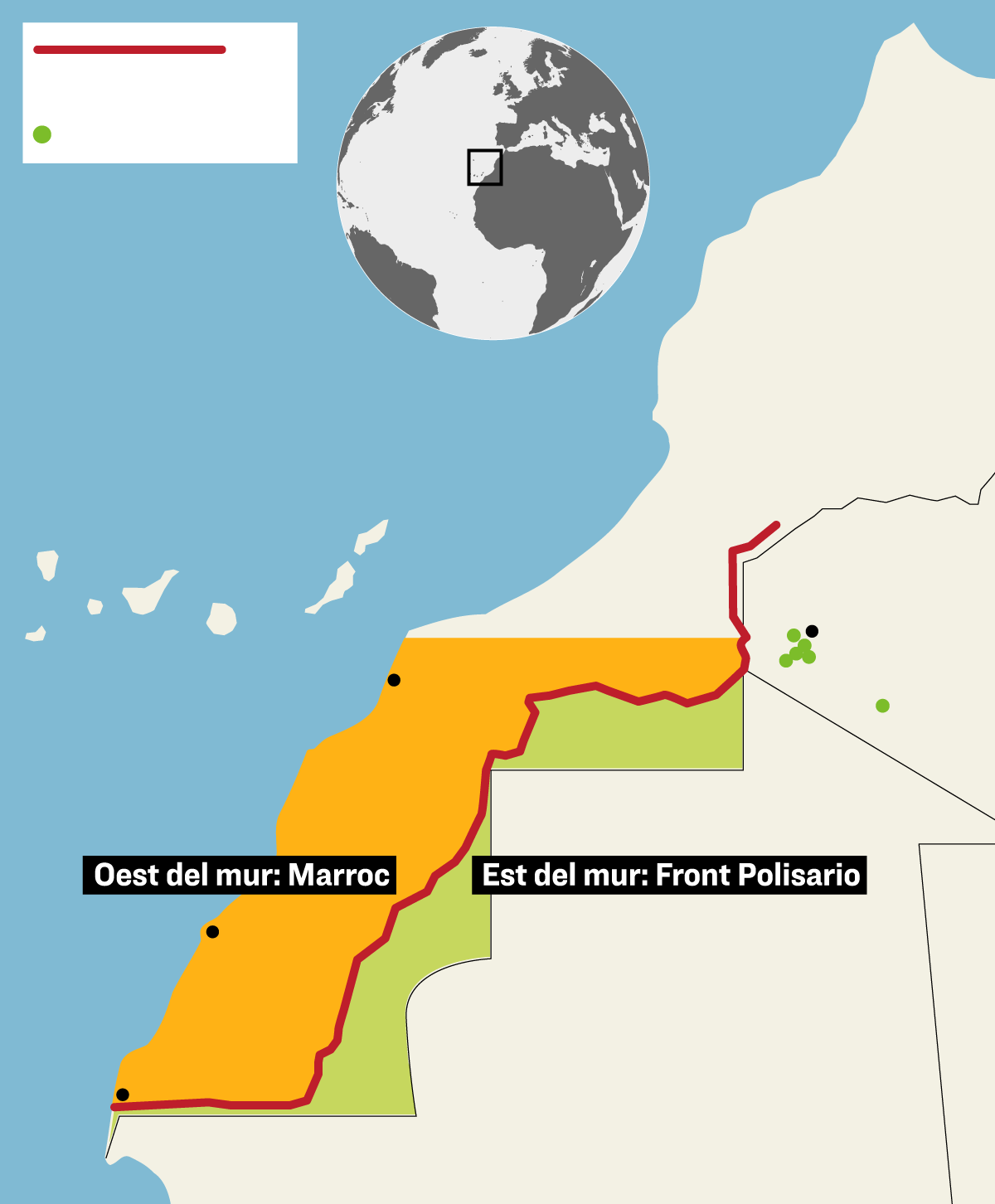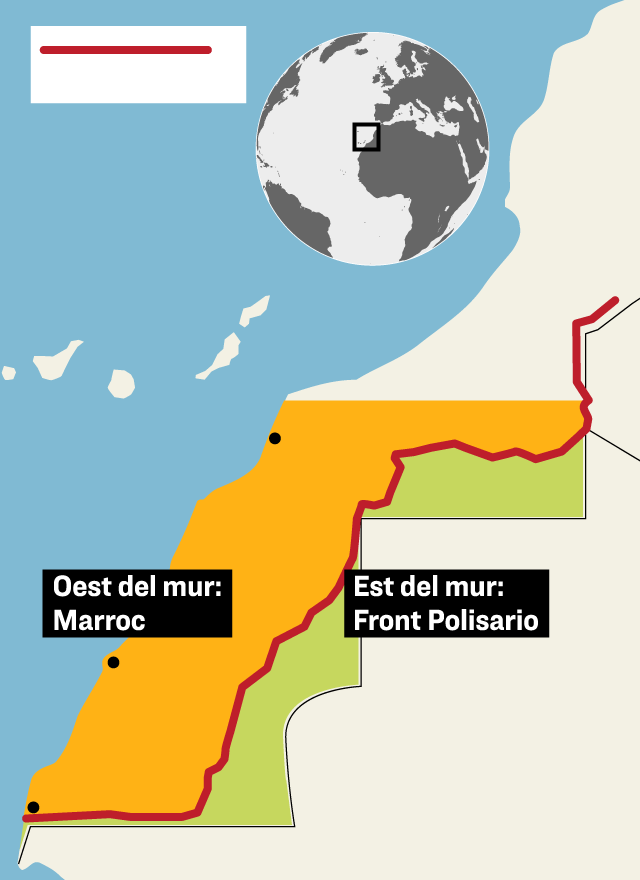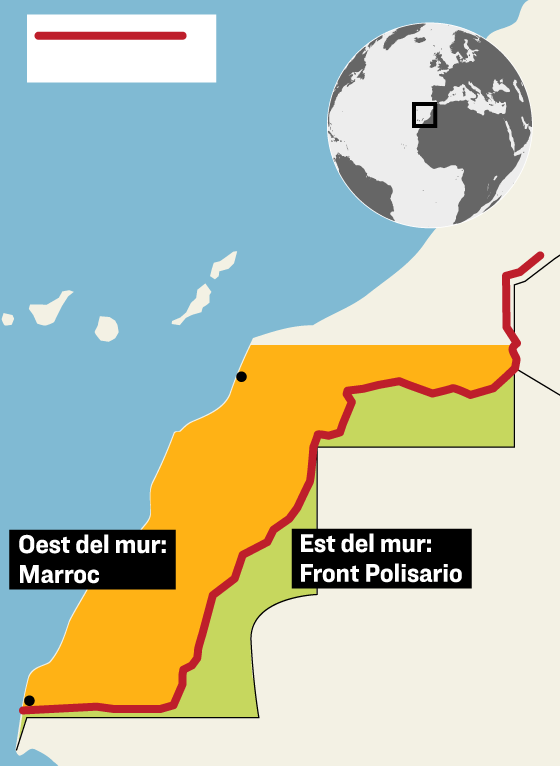Population control and huge investments: this is how Morocco has managed to dominate the Sahara
Trapped in a chronic state of uncertainty, the Sahrawi population sees the dream of a referendum slipping further and further away.


BarcelonaWhen Mahfud Bechri was born, there was a trunk in his home. His parents, like many other Sahrawis in the Tindouf refugee camps, had filled it with belongings so they could return to their homeland. It was 1991, and the UN had committed to holding a referendum on self-determination after agreeing to a ceasefire between the Polisario Front and Morocco, ending 16 years of war. Everything seemed to be in place for the Sahrawis to decide their future, but Rabat blocked the process, and the trunk Mahfud's parents had packed for their return gathered dust until one day it disappeared.
Fifty years after the Moroccan invasion, Western Sahara is still officially considered a non-self-governing territory awaiting decolonization and without a definitive status. But its status is more fragile than ever. Nearly fifty countries recognize Morocco's sovereignty over the territory, where the Sahrawi people represent an ever-decreasing percentage of the population. And the right to self-determination that they are entitled to under the United Nations Charter seems an increasingly distant dream. How did we get to this point?
In November 1975, the then King of Morocco, Hassan II, took advantage of the fact that dictator Francisco Franco was on his deathbed to launch the Green March: a strategic demonstration coordinated by the government in Rabat in which more than 350,000 Moroccan citizens entered the colony. Days later, an agreement was signed in which Spain committed to ending its presence in the Sahara.
But that withdrawal was unilateral and left the Sahara in an anomalous situation. "By leaving, Spain relinquished its status as administering power, even though the UN Charter obliges it to accompany the process toward self-determination," Professor Isaías Barreñada of the Complutense University of Madrid told ARA. "It is an anomaly that has not occurred in any other decolonization process," added this expert on North Africa. Thus, de jure Spain remains the administering power, but de facto It has no presence in the territory. "If Spain hadn't betrayed its responsibility, we wouldn't be in this situation now," Mahfud laments.
With the Moroccan occupation, the Sahrawi population rallied under the banner of the Polisario Front, and clashes began between the two sides, which would eventually lead to the exile of thousands of people to Algeria. Among them were Mahfud's parents. "Algeria opened the border to them, and they entered Tindouf, the nearest city, waiting for the conflict to be resolved. They thought it would be a matter of months," he recounts. But the war lasted 16 years, and the borders established by force remain in place today, reinforced by a 2,700-kilometer wall: Morocco controls 80% of Western Sahara, the coastal area, the richest in resources such as fishing.
Investment and demographic conquest
Since then, Morocco has done everything possible to ensure that the international community considers this annexation irreversible through a policy of fait accompli. It has imposed its control over the Sahara with a strategy based on demographics and investment. On the one hand, it has focused on reversing the territory's demographics by promoting the immigration of Moroccan citizens. Currently, Sahrawis living in the occupied Sahara represent only 1 in 4 inhabitants, while Moroccan settlers now constitute the largest community living there. With these figures, the Rabat government is making it difficult for the Sahrawis to win should a referendum on self-determination eventually be held. On the other hand, it has made enormous investments in infrastructure and showered the former colony with promises of transforming it into a hub Energy and technological projects that, for now, have not materialized. Although the Sahara is rich in phosphates and fishing, today it generates more expenses than benefits for Morocco. It represents less than 5% of Morocco's GDP, but absorbs more than 50% of Rabat's public transfers. This disparity, Barreñada argues, "is unsustainable in the long term," but its objective is "to consolidate the idea that the Sahara is part of Morocco." Added to this is an educational and cultural strategy, according to historian and president of ACAPS, Xavier Serra, who asserts that through the "school system, language policy, and workplace discrimination," the presence of Sahrawi culture and identity has been diminished. To bolster this vision, the role of certain international partners has been key. Morocco has achieved some significant diplomatic victories, such as the recognition of the Sahara's "Moroccan" identity by the United States during Donald Trump's first term. The explicit support for the Moroccan autonomy plan by Pedro Sánchez's government. The latest setback came last Friday at the United Nations Security Council, in a resolution that validated the autonomy plan proposed by Rabat. as a central basis for negotiation to resolve the conflict.
Few prospects for the Sahrawi people
Both within the occupied territory and in the refugee camps, the Sahrawi population lives trapped in a state of chronic uncertainty. In the Sahara controlled by Morocco, many Sahrawis denounce discrimination in access to employment and persecution of any political or cultural expression. Meanwhile, in the Tindouf camps in Algeria, life remains marked by dependence on humanitarian aid and a precarious economy. Despite being one of the regions in Africa with the highest percentage of educated people, the only viable option for most young people to practice their trades is to emigrate. Added to this is the disappointment with the international community for its inaction in the face of increasing Moroccan domination. "Instead of recognizing our rights, the international powers seem to want to legitimize Moroccan employment," laments Mahfud, who asserts that "the dream [of autonomy] has faded over the years."
Now he has two children, born like him in the refugee camps, and in his house, as in so many other Sahrawi homes, there is no longer a single trunk. But he hasn't lost hope: "I hope to be able to live in a free Western Sahara. I don't want my children to live as refugees, like me. If the people decide to live alongside the Moroccans, so be it; what matters is that we can decide."



